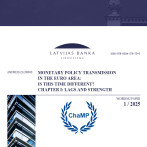A pause in the growth of money supply
Money supply fell slightly in March, reflecting the fluctuating indicators of the economy, particularly in the areas related to domestic demand. If the persistence of foreign demand was characterized by the stable growth of exports, despite the price rises of resources and geological and political unrest in several parts of the world, domestic demand was increasingly moderating as a result of a series of decisions related to raising taxes, as well as the appreciating of foodstuffs and energy resources. A small rise in foreign currency deposits thus continued along with attracted lats deposits dropping for a third consecutive month and demand for cash currency practically at a standstill. Banks' total loan portfolio continued to drop at an almost steady pace.
Money indicator M3, which characterizes the amount of cash and non-cash currency in the economy, dropped by 0.4% in March, with the annual rate of M3 increase falling to 7.1%. The rates of annual increase of bank attracted deposits and amount of money in circulation also dropped (to 4.3% and 18.9% respectively). The drop in M3 was determined by a substantial drop in overnight deposits, with the balance of term deposits and deposits redeemable at notice growing simultaneously. The deposits of both enterprises and households dropped in March, yet their dynamic was different if considered by currency. Export growth ensured a rise in enterprise euro deposits, whereas the low rate of domestic demand and drop in real purchasing power of the population acted to cause the drops in enterprise deposits in lats and household deposits in both lats and euro.
The balance of domestic loans fell to 1.0% in March and the annual rate of dropping loans remained at 8.7%. The reduction was determined primarily by the gradual drop in euro loans granted to enterprises and households while the lats loan balance remained almost unchanged. The drop in consumer credit balance was negligible while housing loans continued to drop at a stable rate.
Risks remain in the area of foreign demand, yet, with the predictions regarding the development of Latvia's trading partners even improving, it is the possible fluctuations in domestic demand that may act to reduce money supply. The sharp rise in the electrical power tariffs; the prolonged rise in fuel prices; the effect of euro interest rate growth on borrowers are all likely to have an adverse influence on the real income of the population, with household deposits in banks gradually dropping. As consumption fluctuates, the deposits of entrepreneurs working in the domestic market are likely to drop and the demand for cash currency will also dwindle. To ensure Latvia's economic growth, it is not only important to bring the budget deficit under 3% of GDP, but also to refrain from taking measures that effect rising inflation, instead promoting structural reforms as part of cutting budget expenditure.
Textual error
«… …»






